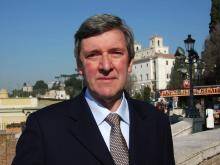For Pope Francis, this is a pivotal moment in European history. A quarter of a century after the collapse of the Berlin Wall, he sees new walls being built in Europe and hears Austria’s Cardinal Christoph Schönborn warn that “the Iron Curtain exists again, but in another way.” He observes that centrifugal forces, driven by nationalisms and xenophobia, threaten to undo the European Union, with its 28 member states and 508 million people, a union that has become “a bastion of peace”—his words—after the most devastating war in history.
Francis has captured the crucial nature of this moment for the European Union and the larger continent of 740 million people. That is why he decided to abandon his lifelong refusal of honors and accept Europe’s most prestigious award, the Charlemagne Prize. He saw this as a providential opportunity to speak to the continent’s heart and reframe the European dream for a new age.
After receiving the prize in the Vatican’s Regal Hall on May 6, this son of European immigrants delivered a remarkable speech to a distinguished audience that included the top European officials and ambassadors, the German chancellor, the king of Spain and Italy’s prime minister.
It was a visionary speech and has been compared to Martin Luther King Jr.’s “I have a dream.” In it Francis shared his “dream” for a new Europe and concluded with challenging words: “I dream of a Europe of which it will not be said that its commitment to human rights was its last utopia.”
While media reports have focused on his “I dream of a Europe” refrain, most overlooked the central part of his discourse, where he called for the building of “a Europe capable of giving birth to a new humanism based on three capacities: the capacity to integrate, the capacity for dialogue and the capacity to generate.”
First of all, he said, it is necessary to develop “the capacity to integrate.” Emphasizing “the urgency of this fundamental task,” he said, “time is teaching us that it is not enough simply to settle individuals geographically: The challenge is that of a profound cultural integration.”
Failure to integrate leads to “the poverty of exclusion,” he added. He sees this failure reflected in the demise of openness to migrants, in the violence in places like Paris and Brussels and in the emergence of new ghettos in many cities. But he is also aware of many positive experiences of integration, one of which emerged as he was speaking when London elected its first Muslim mayor, the son of a Pakistani immigrant.
Integration is one key word in Francis’ vision; dialogue is another. Aware that “the capacity to dialogue” is in short supply in European politics today, he reminded these leaders that “we are called to promote a culture of dialogue by every possible means and thus to rebuild the fabric of society.” This “enables us to view others as valid dialogue partners, to respect the foreigner, the immigrant and people from different cultures as worthy of being listened to.” Indeed, “peace will be lasting in the measure that we arm our children with the weapons of dialogue.”
He called for the culture of dialogue to be “an integral part of the education imparted in our schools,” and he highlighted the urgent need in the wider society “to build ‘coalitions’ that are not only military and economic, but cultural, educational, philosophical and religious.” He reaffirmed the need to build bridges, not walls.
Francis is well aware of the fragile political situation in Europe, which could become worse if Britain votes to leave the European Union on June 23. With this in mind, he turned to “the capacity to generate” jobs and hope.
Millions of young Europeans are unemployed. He told Europe’s political leaders, “If we want to rethink our society, we need to create dignified and well-paying jobs, especially for our young people.” This requires “coming up with new, more inclusive and equitable economic models”; it means moving from “a liquid economy directed at revenue, profiting from speculation and lending at interest” to “a social economy that invests in persons by creating jobs and providing training.”
In developing these three capacities, Francis said the church “can and must play its part.” It can begin by “going forth to bind the wounds of humanity with the powerful yet simple presence of Jesus, and his mercy that consoles and encourages.”








